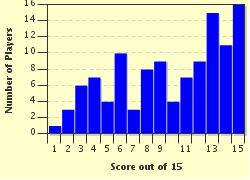Quiz Answer Key and Fun Facts
1. In Nehemiah 2:4a King Artaxerxes asks what Nehemiah's request is. In verse 5, Nehemiah asks to be sent to Jerusalem.
But what, as recorded in the last half of verse 4, did Nehemiah do *before* answering the King? (NKJV text)
2. As recorded in Nehemiah 2:11-16, what, in regard to his purpose in coming to Jerusalem, did Nehemiah do in secret during his first three days there?
3. When work on the walls began, certain people were angry about it. Their names, as recorded in Nehemiah 2:19, were Sanballat, Tobiah and Geshem. According to the NKJV, of what three tribes were they?
4. In Nehemiah 4:2 (NKJV), Sanballat mocked the Jews. Among other jests exchanged with his friends was one with reference to Jerusalem which has become proverbial of Rome. Which is it?
5. It is fairly well known that those workers who had at least one free hand held a weapon in it, for defense against the threat of the pagan tribes. According to Nehemiah 4:18, where were the weapons of those builders who had to work with both hands?
6. At the end of Nehemiah 5:15, why did Nehemiah say he refrained from burdening the people (with taxes, or harsh rule)?
7. Sanballat, Tobiah, Geshem and others were plotting against Nehemiah and the builders, making false accusations against Nehemiah specifically, and trying to intimidate them all (Nehemiah 6:1-9). In these circumstances, what was Nehemiah's prayer at the end of Nehemiah 6:9 (NKJV text)?
8. In Nehemiah 8:1-6, who read to the people from the Law of Moses?
9. In Nehemiah 8:9, what was the response of the people to the reading of the Law?
10. Also known as the 'festival of booths', what feast, prescribed by Moses, was reinstituted after the reading of the Law, according to Nehemiah 8:13-18?
11. In Nehemiah 9, what is it that the people did after hearing the readings and holding the prescribed feast?
12. As recorded in Nehemiah 9:38 - 10:39, to what did the leaders of the people put their seals, to which all the people gave their assent?
13. According to Nehemiah 11:1, what proportion of the people were to dwell in the city of Jerusalem itself?
14. For the religious ceremony of the dedication of the wall of Jerusalem, in Nehemiah 12:31, Nehemiah appointed two groups of people for what purpose?
15. According to Nehemiah 13:4-9, Eliashib the priest had given Tobiah the enemy a room in the Temple, where Tobiah was apparently living. What was Nehemiah's response when he found out about it? (verse 8)
Source: Author
Rimrunner
This quiz was reviewed by FunTrivia editor
CellarDoor before going online.
Any errors found in FunTrivia content are routinely corrected through our feedback system.

